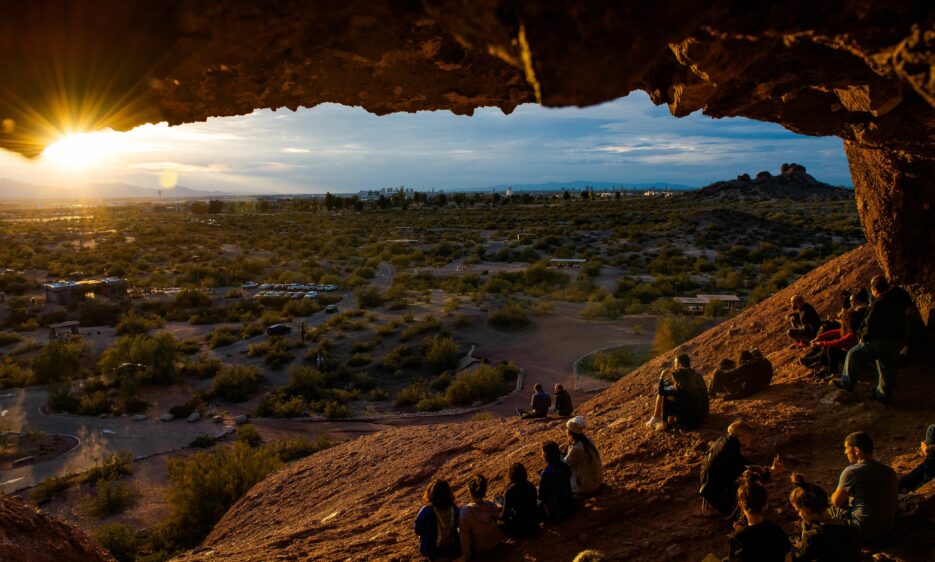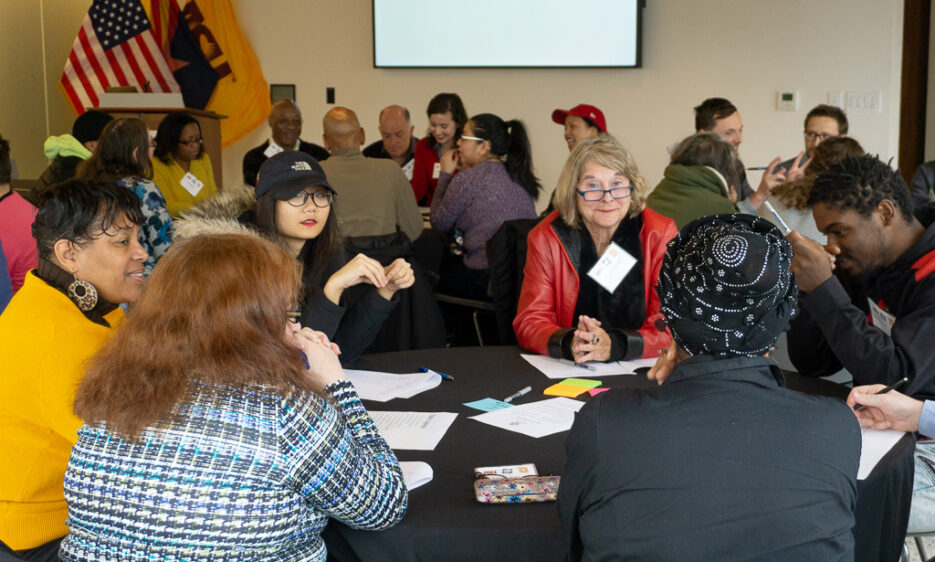Past CSPO Events
- April 28, 2022CSPO DC
Imagining COP60: Scenarios, Sci-fi, and Policy Tools in Post-Normal Fiction
Last year’s COP26 was one of the most widely followed events in the history of climate politics. Though new, more ambitious agreements were reached, the world was left with big questions about whether nations would be able to limit global warming to 1.5°C—and how we will adapt to the changes and climate chaos coming.
In his debut book, Our Shared Storm: A Novel of Five Climate Futures, climate fiction author Andrew Dana Hudson imagines the five possible futures for the COP and climate politics. Inspired by the IPCC’s Shared Socioeconomic Pathways scenarios, which were used in the recent Sixth Assessment Report, the stories examine the cultures of climate policy making in futures that range from hopeful to harrowing. The book also includes non-fiction discussions of the opportunities and challenges of writing climate fiction and using stories to advance policy thinking.
Andrew Hudson
- April 22, 2022CSPO DC - New Tools for Science Policy
Broadening STEM Participation in Rural and Remote Communities
Cultivating regional STEM hubs in rural Arizona communities

Kalman Mannis
- April 12, 2022CSPO DC - New Tools for Science Policy
No Help Wanted: Outside Technical Advice for the US Military
John Alic
- March 24, 2022CSPO DC
Webinar: Vannevar Bush, Engineer of the American Century
Vannevar Bush’s influence on the history and institutions of US science and technology is unrivaled, but he remains relatively unknown outside wonky science policy circles. G. Pascal Zachary, Bush’s biographer and editor of a new collection of Bush’s writings, The Essential Writings of Vannevar Bush (Columbia University Press, 2022) talks with historian of science and technology Emily Gibson about this remarkable figure, and why Bush’s pioneering insights and lucid writings deserve a wide audience today.
G. Pascal (Gregg) Zachary
- March 21, 2022CSPO DC - New Tools for Science Policy
Framing Our Biological Futures
Preliminary Results from U.S. Public Engagement Forums
Genome editing techniques have rapidly advanced in the past two decades. Recently, the CRISPR/Cas9 system has made this technology more accessible, precise, and less expensive. This has opened the door for wider use, but also raised many questions about ethics, morality, risk, and inequalities. How should this suite of technologies be used? Under what conditions? How should it be governed? The scientific community alone cannot answer these questions.
Arizona State University, Baylor College of Medicine and the Museum of Science, with funding support from the National Institutes of Health and the Kettering Foundation, worked with experts and stakeholders to create a series of informed national citizen deliberations around the ethics and governance of genome editing. These deliberations with diverse members of the general public held in Boston, Phoenix, Waco and online in Fall 2021, offer early insight into the public values around the future opportunities and challenges with these technologies. On March 21, join the project team as they share preliminary insights and results gathered from these national deliberations and launch a broader conversation about how these results and public engagement approaches can inform research, engagement and governance of human gene editing.
Cynthia Selin, Christopher Scott, David Tomblin, Janine Myszka , Lauren Lambert, Haley Manley, Dorit Barlevy
- December 17, 2021CSPO DC
Webinar: Does Engineering Education Need a Revolution?
The basic structure of engineering education was set in 1955 and hasn’t changed much since. Rather than hands-on problem solving, classes emphasize theory, while a “pipeline mindset” perpetuates a system designed to keep people out rather than welcome them in. How can engineering schools connect their curricula to solving the broader social justice, equity, and environmental issues that motivate today’s students?
On December 17 at 3 PM ET, join past president of the American Society for Engineering Education Sheryl Sorby, current ASEE executive director Norman L. Fortenberry, and Gilda Barabino, president of the Franklin W. Olin College of Engineering, for a discussion moderated by Chemical & Engineering News science news editor Jessica Marshall on what it will take to prepare tomorrow’s engineers for our digital, diverse, global, and rapidly changing society. Register today!
- December 15, 2021CSPO DC - New Tools for Science Policy
Operationalizing Public Participation in Federal Science & Tech Policy
A "Whole of Society" approach

Calls abound to increase diversity, equity, inclusion and access in federal policy and decision-making. The need to operationalize democratic governance of science and technology research and development is clear, yet few methods exist to do so. In 2010, a group of researchers, educators, and policy practitioners led by Arizona State University, the Museum of Science Boston, SciStarter, the Loka Institute, and the Woodrow Wilson International Center for Scholars established the Expert and Citizen Assessment of Science and Technology (ECAST) network to address this gap. Over the course of a decade, ECAST has developed an innovative and reflexive participatory technology assessment (pTA) method to support informed, inclusive, and democratic science policy decision-making. The network has conducted public deliberations across the United States. ECAST’s portfolio of topics and sponsors include planetary defense (NASA), community resilience (NOAA), nuclear waste (DOE), gene drives (DARPA), driverless cars (Kettering Foundation and Charles Koch Foundation), geoengineering (Alfred P. Sloan Foundation) and human gene editing (NIH).
Join the ECAST network partners on December 15th from 3-5:30 PM ET to learn about pTA methods and applications, participate in a forum simulation and learn about the opportunities, challenges, and successes of this stakeholder and public engagement method.
This event is invitation only. Please email Mahmud Farooque if you would like to attend.
Nicholas Weller, Darlene Cavalier, Mahmud Farooque, David Sittenfeld, Emily Hostetler, David Tomblin, Jennifer Schneider, Amy Kaminski, Carrie McDougall, Evan Michelson
- November 16, 2021CSPO DC
True Stories That Matter: Applying Creative Nonfiction to Science & Policy Writing

You’ve produced some important research or a policy plan that could create meaningful change. How do you make your ideas and proposals stand out and get read? Creative nonfiction offers a way for researchers, policy wonks, program managers, grant writers, and writers of all forms to turn their ideas into compelling narratives.
Join Lee Gutkind, the “Godfather” behind creative nonfiction (Vanity Fair), on November 16 from 12:00-1:00 pm for an in-person CSPO Conversation! He will introduce and deconstruct the basic techniques of the genre and how they can be applied to make complicated ideas more appealing to a general audience. There will be a special emphasis on scene writing, a technique that will help readers understand and relate to scientific issues and ideas.
Masks are required. A livestream will also be available.
Register here to join us in-person or to receive the livestream link!
Lee Gutkind